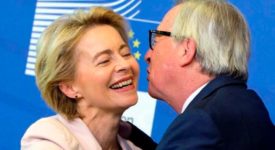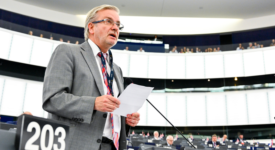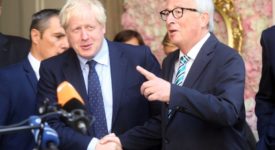When EU leaders nominated Jean-Claude Juncker to be European Commission president on Friday (27 June), they simultaneously handed a large chunk of power to the European Parliament. Juncker’s nomination which was taken by a vote – a first for an EU Summit – also constitutes a new shift in the balance of power in the EU capital, to the European Parliament’s gain. This novel process was pushed through by MEPs in which they insisted that the future president of the European Commission should be the leading candidate of the party winning the EU vote earlier in May – in this case Juncker for the center-right EPP – to who must then be formally nominated by EU leaders. The European Parliament will vote to nominate Jean-Claude Juncker as new Commission president on 15 July, one day earlier than planned, in order to give more time more time for EU leaders who will meet in Brussels on 16 July to decide on a package of other top EU jobs, including the council presidency. If Juncker makes it through parliament, it will be the first time in EU history that the Commission president has not been chosen directly by EU leaders.
The MEPs also elected a new, or rather newish, President of the EU’s main legislative body – Martin Schulz who said in his inaugural speech that “As the first President to be re-elected to this office, I appreciate that it is an extraordinary honor. I realize that this – for this House – unprecedented step confers a particular obligation upon me, and I intend to show myself equal to it – I take it very seriously.” MEPs will return to Brussels next week to complete unfinished election business – to formally approve the chairperson positions of the Parliament’s 20 standing committees. While the committees’ membership was confirmed by MEPs in Strasbourg yesterday (3 July), the chairs will be formally elected when the committees hold their constitutive meetings on Monday (7 July). Based on a deal between the seven political groups in the Parliament, the center-right EPP group, being the largest faction with 221 of the Parliament’s 751 MEPs, will likely be awarded a total of eight chairman positions. Finally, these are some names of the frontrunners for the top posts in the most important committees: German Christian Democrat Elmar Brok is expected to retain the chairmanship of the foreign affairs committee, center-left deputy Roberto Gualtieri and the EPP’s Giovanni La Via have been nominated to take the post of the chairman of the economic affairs and environment committees, while Polish center-right MEP Jerzy Buzek is poised to take the chair of the industry committee.
Article Categories:
INSTITUTIONS & POLICY-MAKING






